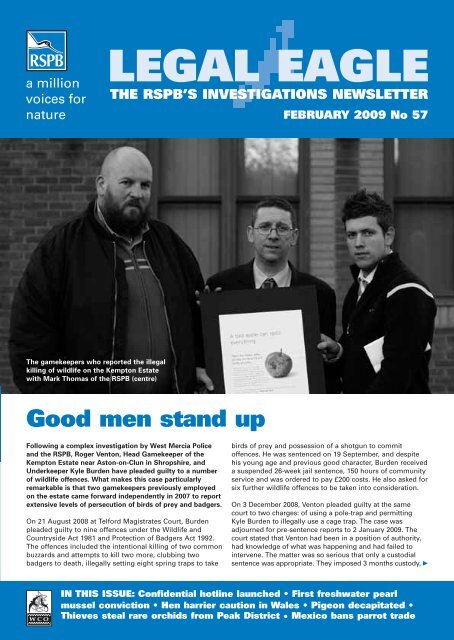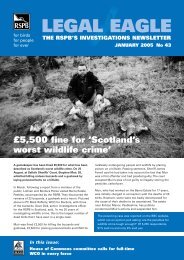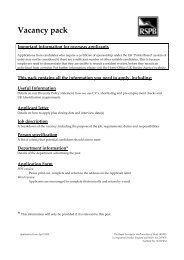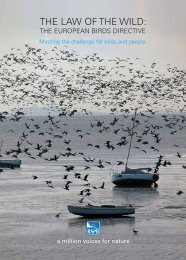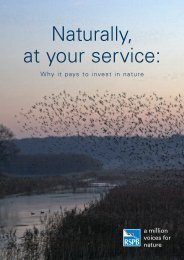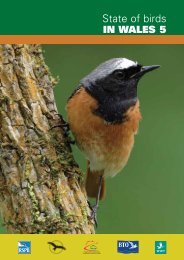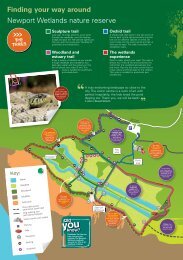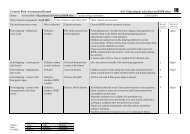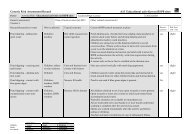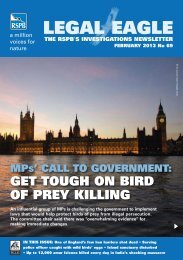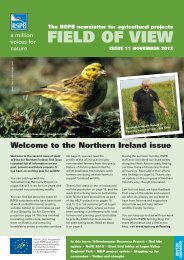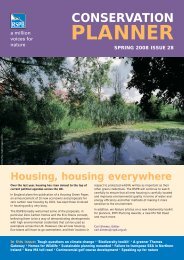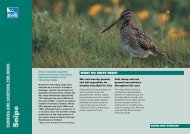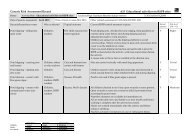Legal Eagle 57 - RSPB
Legal Eagle 57 - RSPB
Legal Eagle 57 - RSPB
You also want an ePaper? Increase the reach of your titles
YUMPU automatically turns print PDFs into web optimized ePapers that Google loves.
a million<br />
voices for<br />
LEGAL EAGLE<br />
THE <strong>RSPB</strong>’S INVESTIGATIONS NEWSLETTER<br />
nature FEBRUARY 2009 No <strong>57</strong><br />
The gamekeepers who reported the illegal<br />
killing of wildlife on the Kempton Estate<br />
with Mark Thomas of the <strong>RSPB</strong> (centre)<br />
Good men stand up<br />
Following a complex investigation by West Mercia Police<br />
and the <strong>RSPB</strong>, Roger Venton, Head Gamekeeper of the<br />
Kempton Estate near Aston-on-Clun in Shropshire, and<br />
Underkeeper Kyle Burden have pleaded guilty to a number<br />
of wildlife offences. What makes this case particularly<br />
remarkable is that two gamekeepers previously employed<br />
on the estate came forward independently in 2007 to report<br />
extensive levels of persecution of birds of prey and badgers.<br />
On 21 August 2008 at Telford Magistrates Court, Burden<br />
pleaded guilty to nine offences under the Wildlife and<br />
Countryside Act 1981 and Protection of Badgers Act 1992.<br />
The offences included the intentional killing of two common<br />
buzzards and attempts to kill two more, clubbing two<br />
badgers to death, illegally setting eight spring traps to take<br />
birds of prey and possession of a shotgun to commit<br />
offences. He was sentenced on 19 September, and despite<br />
his young age and previous good character, Burden received<br />
a suspended 26-week jail sentence, 150 hours of community<br />
service and was ordered to pay £200 costs. He also asked for<br />
six further wildlife offences to be taken into consideration.<br />
On 3 December 2008, Venton pleaded guilty at the same<br />
court to two charges: of using a pole-trap and permitting<br />
Kyle Burden to illegally use a cage trap. The case was<br />
adjourned for pre-sentence reports to 2 January 2009. The<br />
court stated that Venton had been in a position of authority,<br />
had knowledge of what was happening and had failed to<br />
intervene. The matter was so serious that only a custodial<br />
sentence was appropriate. They imposed 3 months custody, 3<br />
IN THIS ISSUE: Confidential hotline launched • First freshwater pearl<br />
mussel conviction • Hen harrier caution in Wales • Pigeon decapitated •<br />
Thieves steal rare orchids from Peak District • Mexico bans parrot trade
4 concurrent on each offence, suspended for 12 months.<br />
Venton was also required to undertake 250 hours unpaid<br />
work in the community and pay £2,000 costs.<br />
The shooting on the Kempton Estate is managed by Bettws<br />
Hall, based in Newtown in Wales. During the hearings of<br />
Venton and Burden, the court heard that one of the<br />
gamekeeper witnesses contacted <strong>RSPB</strong> Investigations<br />
in June 2007. He reported that he had witnessed extensive<br />
persecution, which included several buzzards being shot,<br />
and badgers caught in snare traps and then clubbed to<br />
death. He initially contacted the National Gamekeepers’<br />
Organisation (NGO), but, having received an unsatisfactory<br />
response, contacted the British Association of Shooting<br />
and Conservation (BASC) who advised him to contact the<br />
www.newsteam.co.uk<br />
Press Association<br />
authorities. The second gamekeeper witness was employed<br />
to replace the first, and decided to leave after only a week<br />
on the estate. He also contacted the <strong>RSPB</strong> to report<br />
offences including the use of a pole-trap by Venton. Of<br />
particular concern was that both witnesses described<br />
in detail a ‘vermin’ notebook held by Burden, which they<br />
said documented the extensive killing of buzzards and other<br />
wildlife during 2007. <strong>RSPB</strong> Investigations undertook<br />
surveillance on the estate, and Venton was filmed tending<br />
to a pheasant release pen containing a set pole-trap.<br />
On 31 July 2007, the <strong>RSPB</strong> assisted West Mercia Police<br />
in carrying out search warrants on the estate. During the<br />
search, the notebook described by the witnesses was found<br />
in the possession of Kyle Burden. This listed 102 buzzards,<br />
40 ravens and 37 badgers, plus entries believed to relate<br />
to other raptors. A raven that had been shot was also found<br />
on the estate. Both Burden and Venton, after denying any<br />
involvement during interview, were reported for offences.<br />
After the case, <strong>RSPB</strong> Investigations Officer Mark Thomas<br />
praised the two witnesses saying, “Their actions were brave,<br />
public spirited and show the decent law abiding face of<br />
game keeping.” The <strong>RSPB</strong> wishes to place on record our<br />
thanks to the two witnesses in this case, CPS Solicitor Phil<br />
Mason, Barrister Geoffrey Dann and PC Tim Griffiths.<br />
Kyle Burden<br />
Roger Venton<br />
Read a first-hand account at:<br />
http://blogs.rspb.org.uk/investigations<br />
Confidential hotline launched<br />
On 3 December 2008, following the revelations during the<br />
investigation of events on the Kempton Estate, the <strong>RSPB</strong><br />
launched a confidential hotline to provide a way for people<br />
to report offences against birds of prey. The hotline is<br />
primarily intended for gamekeepers and people in the<br />
shooting industry. It allows people to supply information<br />
in confidence, and to report situations in which they are<br />
pressured into breaking the law or killing birds of prey<br />
as part of their job.<br />
advert for the hotline in a number of magazines, although<br />
Shooting Times has already refused to place the advert.<br />
The confidential hotline is 0845 4663636 (0845 GOODMEN),<br />
www.rspb.org.uk/goodmen<br />
Over 70% of those convicted of offences relating to the<br />
persecution of birds of prey are employed in the game<br />
industry, and they are invariably gamekeepers. Although<br />
it is often the gamekeeper with his ‘finger on the trigger’,<br />
the <strong>RSPB</strong> believes that it is those within the shooting<br />
industry – the employers and managers of gamekeepers –<br />
who are primarily responsible for the continuing<br />
persecution of birds of prey. These are people who<br />
have been orchestrating these offences for decades and<br />
hiding behind the criminal actions of their staff.<br />
Many gamekeeping jobs include a house as part of the<br />
employment benefits. This gives senior staff a big hold<br />
over gamekeepers, as anybody who speaks out risks losing<br />
not only their job, but also their home. In recent years,<br />
a number of gamekeepers have come forward to report<br />
crimes, and we hope that this new hotline will encourage<br />
others to come forward. The <strong>RSPB</strong> intends to place the<br />
2
PROSECUTIONS<br />
White-tailed eagle<br />
Chris Gomersall (rspb-images.com)<br />
£600 fine for white-tailed<br />
eagle disturbance<br />
On 6 October 2008, Alistair Waters of<br />
Lee Crescent, North Aberdeen, was fined<br />
£600 at Oban Sheriff Court for recklessly<br />
disturbing a white-tailed eagle.<br />
Waters was seen taking photographs<br />
at the Mull nest site on 4 March 2008,<br />
and an eagle was seen flying and<br />
calling in a distressed manner. All eagle<br />
nests on Mull are closely monitored,<br />
and WCO PC Finlay Christine informed<br />
the court an egg had been laid in the<br />
24-hour period prior to the disturbance.<br />
The nest subsequently failed.<br />
Mull <strong>Eagle</strong> Watch is held every year.<br />
Signs are placed all over the island and<br />
a public hide allows visitors to view<br />
the eagles without disturbing them.<br />
White-tailed eagles receive special<br />
protection under Schedule 1 of the<br />
Wildlife and Countryside Act 1981,<br />
and their nests are legally protected<br />
all year round.<br />
Sheriff Douglas Small said, “I have<br />
to take into account the consequences<br />
(to the birds) of this reckless conduct.”<br />
<strong>RSPB</strong> Mull Officer Dave Sexton<br />
also commented, “We welcome<br />
responsible tourists to Mull. What<br />
happened here wasn’t responsible,<br />
it was reckless.”<br />
Acquittal over ‘gift’ of eggs<br />
A South Shields man has been<br />
sentenced to a nine-month conditional<br />
discharge after illegally buying two<br />
stuffed birds of prey.<br />
On 15 October 2008, John Dodsworth<br />
of Rodin Avenue, South Shields, was<br />
sentenced at Newcastle Crown Court<br />
after pleading guilty to the purchase<br />
of a marsh harrier and a honey<br />
buzzard contrary to Regulation 8,<br />
the Control of Trade in Endangered<br />
Species (COTES) Regulations 1997.<br />
Both species are listed on Annex A<br />
of the EU’s CITES regulations.<br />
Dodsworth was found not guilty on<br />
three charges, and one other charge,<br />
for the purchase of further Annex A<br />
specimens, was discontinued.<br />
The investigation began in late<br />
October 2006, following a search<br />
warrant executed by Northumbria<br />
Police, assisted by the <strong>RSPB</strong>. A large<br />
egg collection was seized, which<br />
contained some CITES Annex A<br />
species such as golden eagles and<br />
honey buzzards, as well as a number<br />
of taxidermy specimens.<br />
During interview, Dodsworth claimed<br />
he had bought a number of taxidermy<br />
specimens, including some from eBay,<br />
and that no Article 10 Certificates had<br />
been supplied. He claimed he had<br />
purchased a large cabinet from the<br />
recently deceased egg collector Michael<br />
Dawson for £600, and that the several<br />
hundred eggs it contained ‘came free’.<br />
In court, Dodsworth stated he had<br />
been trying to build up a collection<br />
of eggs from legitimate sources. He<br />
accepted that he had been devastated<br />
when a large egg collection had been<br />
confiscated following a previous<br />
conviction in 1998, but denied the<br />
purchase of the cabinet was a ruse<br />
to obtain the eggs. An experienced<br />
auctioneer gave evidence and valued<br />
the cabinet at less than £100. However,<br />
he was found not guilty in relation to<br />
this matter. The <strong>RSPB</strong> believes a change<br />
G Shorrock (<strong>RSPB</strong>)<br />
in the law may be necessary to cater for<br />
the situation where CITES specimens<br />
prohibited from trade are supplied<br />
free as part of a financial transaction.<br />
Dodsworth still has to face several<br />
charges relating to the possession<br />
of birds’ eggs and taxidermy<br />
specimens, and is expected back<br />
in Magistrates Court in 2009.<br />
The <strong>RSPB</strong> would like to thank<br />
Northumbria Police WCO Derek<br />
Moss (now retired), PC Paul Henery,<br />
Michael Stephenson (CPS), Tom<br />
Moran (Barrister) and expert witnesses<br />
Eric Moreton and Andrew McCoull<br />
for their assistance in this case.<br />
Dodsworth was<br />
convicted of purchasing<br />
a honey buzzard and a<br />
marsh harrier<br />
3
Damage assessment<br />
for freshwater pearl<br />
mussels on the River Irt<br />
Cumbria Police<br />
First freshwater pearl<br />
mussel conviction<br />
The Environment Agency and Cumbria<br />
Police have secured the first<br />
successful UK prosecution for damage<br />
to freshwater pearl mussels and their<br />
habitat. On 19 September 2008, Jason<br />
Phizacklea of Santon pleaded guilty at<br />
Whitehaven Magistrates Court to<br />
offences under the Wildlife and<br />
Countryside Act 1981, the Salmon and<br />
Freshwater Fisheries Act 1975 and the<br />
Water Resources Act 1991.<br />
The charges relate to an incident in<br />
February 2008 when Phizacklea took<br />
an excavator into the River Irt in<br />
Cumbria without Environment Agency<br />
permission, causing extensive damage<br />
to over 1 km of the river and<br />
destroying freshwater pearl mussels<br />
and thousands of salmon and trout<br />
eggs. Phizacklea received a 12-month<br />
conditional discharge and was ordered<br />
to pay £2,350 in costs.<br />
Extinct in much of England and Wales,<br />
freshwater pearl mussels are protected<br />
through national and international<br />
legislation, and it is an offence to<br />
remove, handle or disturb them.<br />
The only English rivers currently<br />
supporting significant populations<br />
are in Cumbria and Northumberland –<br />
the Environment Agency is unable to<br />
predict if the River Irt will ever recover.<br />
Jonathan Shatwell, Area Environment<br />
Manager at the Environment Agency,<br />
said, “The extent of the damage<br />
caused in this incident was<br />
unprecedented and could have been<br />
avoided if advice had been sought<br />
from the Environment Agency.”<br />
A thousand pound ‘tern for the worse’<br />
In June 2008, fishery owner Gordon<br />
Burgess, of Alan Moss Road in<br />
Loughborough, Leicestershire, was<br />
witnessed shooting a common tern,<br />
which was flying over Donnington<br />
lake, Hemmington, Leicestershire.<br />
The dead bird was recovered from<br />
the water by the witnesses who<br />
had been fishing on the lake, and<br />
4<br />
the matter was reported to the police.<br />
Burgess was interviewed and denied<br />
the offence. An impact statement<br />
was supplied by <strong>RSPB</strong> Investigations<br />
and the case was overseen by WCO<br />
Neil Hughes.<br />
At Loughborough Magistrates Court<br />
on 21 November 2008, Burgess<br />
pleaded guilty to injuring the bird<br />
and going equipped with a shotgun<br />
to commit the offence. He was fined<br />
£1,000 and instructed to pay £200<br />
costs for what the magistrates termed<br />
a ‘regrettable incident’.<br />
Burgess had earlier suggested he<br />
thought the bird was a black-headed<br />
gull, ironically a species that is also<br />
fully protected.
Community service for<br />
Essex wild bird trader<br />
John Stanley Brockis, of Great Totham, Essex, has been<br />
ordered to carry out 120 hours of unpaid work and pay<br />
costs of £8,679.09 after pleading guilty to four charges<br />
of illegally possessing wild birds and two charges of<br />
exposing wild birds for sale.<br />
The sentencing at Southend Magistrates Court on<br />
18 November followed a year-long investigation into<br />
Brockis’ business, Woodlea Birds. Test purchases by the<br />
RSPCA led to a joint Essex police and RSPCA search<br />
warrant on Woodlea Birds in November 2007. A large<br />
number of birds were discovered, including one redpoll,<br />
29 goldfinches, five greenfinches and five bullfinches.<br />
All of the birds had been illegally fitted with tampered<br />
leg rings. Expert Roger Caton examined the birds and<br />
concluded that none of them had been legally bred in<br />
captivity. Brockis claimed he purchased the birds in<br />
good faith from people who arrived with them in his shop,<br />
and he thought the leg rings were legitimate.<br />
Inspector Cliff Harrison, from RSPCA’s Special Operations<br />
Unit, said, “This is a very serious case as it involves a<br />
large number of birds and clearly a profit is being made<br />
on the back of their suffering. We are grateful to WCO<br />
PC Andrew Long and his team at Essex Police for their<br />
assistance in this case.”<br />
PC Andrew Long, Essex Police Wildlife Crime Co-ordinator,<br />
added, “This case once again shows that where possible<br />
Essex Police will work with other agencies to tackle wildlife<br />
crime. Essex Police takes wildlife crime seriously and I urge<br />
anyone with information on any aspect of Wildlife Crime to<br />
contact their local Essex Police Wildlife Crime Officer on<br />
0300 333 4444 or e-mail wildlife@essex.pnn.police.uk”<br />
Motoring madness<br />
In May 2008, WCO PC Andy Swinburne<br />
of Northumbria Police was informed<br />
of video footage on the website<br />
YouTube showing two males filming<br />
themselves driving off road within<br />
Lindisfarne National Nature Reserve.<br />
The reserve is designated an SSSI<br />
and affords European Protection<br />
as a Special Area of Conservation.<br />
The footage, “Cav Holy Island”,<br />
depicted a white Vauxhall Cavalier<br />
performing over a dozen handbrake<br />
turns off the public road linking the<br />
island to the mainland, destroying<br />
habitat and endangering the lives<br />
of other road users. The date of the<br />
offence could not be established<br />
and direct evidence of SSSI damage<br />
could not be recovered, but head<br />
warden Phil Davey stated that<br />
valuable saltmarsh habitat and<br />
intertidal sand flats would have<br />
been churned up during the frenzied<br />
driving spree.<br />
On 15 October 2008, the driver, Paul<br />
Gilmore of Prospect Avenue, Wallsend,<br />
and the passenger, Osmond Lee<br />
Pearson of Greencroft Avenue, Walker,<br />
appeared at Newcastle Crown Court.<br />
The two men, both aged 30 and from<br />
North Tyneside, pleaded guilty to<br />
reduced charges of careless driving<br />
and aiding and abetting careless<br />
driving respectively. They received a<br />
six-month conditional discharge and<br />
three penalty points each.<br />
PC Swinburne commented, “This<br />
case highlights problems faced by<br />
off-roading on SSSI sites; the potential<br />
Natural England<br />
Lindisfarne National Nature Reserve<br />
damage to habitats, as well as injury<br />
to those actively involved and innocent<br />
bystanders. Close collaboration<br />
between agency partners and keen<br />
media interest helped bring about<br />
the downfall of those responsible<br />
and the media coverage has also<br />
acted as a great deterrent in the<br />
problem of off-road driving.”<br />
5
Gamekeeper drove a horse<br />
and cart through the law<br />
On 20 November 2008, and following<br />
an earlier guilty plea, James Freeman,<br />
Head Gamekeeper on the Stein<br />
Estate, Nidderdale, North Yorkshire,<br />
was sentenced for eight charges<br />
under the Food and Environment<br />
Protection Act 1985 (FEPA) and The<br />
Health and Safety at Work Act 1974.<br />
These related to the unlawful storage<br />
and use of five different pesticides.<br />
Freeman was fined £750.<br />
In 2006, the <strong>RSPB</strong> received information<br />
that a male in the Midlands was<br />
supplying pesticides, acquired from<br />
Ireland, to several shooting estates<br />
in the north of England for use in<br />
illegal predator control.<br />
In the spring of 2007, following calls<br />
from the public, the <strong>RSPB</strong> located a<br />
dead buzzard, a dead gull and a number<br />
of rabbit carcasses on two of the estates<br />
mentioned. Analysis confirmed the<br />
6<br />
pesticide alphachloralose, which has<br />
a long history in wildlife poisoning.<br />
In May 2007, ‘Operation Worm’ – a joint<br />
operation involving North Yorkshire and<br />
West Mercia Police forces, supported by<br />
Natural England, the Defra Investigation<br />
Service (DIS) and the <strong>RSPB</strong> – executed<br />
warrants at a number of addresses.<br />
A number of unapproved and<br />
improperly stored pesticides, including<br />
alphachloralose imported from Eire,<br />
were discovered at an address in<br />
Shropshire. A man was later cautioned<br />
for offences (see <strong>Legal</strong> <strong>Eagle</strong> 55).<br />
A container of alphachloralose was<br />
found in a gun cabinet at Freeman’s<br />
home. The origin of this product was<br />
not ascertained. Containers of<br />
unapproved strychnine and the<br />
fumigant Phostoxin were found stored<br />
in his home, a vehicle and an insecure<br />
outbuilding. His pesticide store was<br />
Head Gamekeeper, James<br />
Freeman, was convicted<br />
of eight pesticide offences<br />
Yorkshire Post Newspapers<br />
not signed and did not have proper<br />
provisions for storing fumigant<br />
pesticides. In the store were containers<br />
of Cymag, which was made illegal in<br />
1997, and even more alarming was<br />
a quantity of Cymag decanted into a<br />
glass jar. An Enforcement Notice was<br />
later served for proper disposal of a<br />
wide range of unapproved pesticides.<br />
The Judge stated that Freeman had<br />
‘driven a horse and cart’ through the<br />
regulations, but the fine was limited<br />
by his financial situation. No costs<br />
were awarded, but the Judge<br />
unusually indicated that the estate<br />
might like to consider making a<br />
donation to a charity of its choice<br />
for the costs of £680 requested by<br />
the CPS. The estate is owned by<br />
Lord Vestey, who is classed as one<br />
of the wealthiest men in Britain.<br />
The investigation also implicated the<br />
Shooting Land Agent Simon Clowes<br />
of the firm David and Bowring for<br />
failing to properly supervise Freeman<br />
and ensure pesticides were legally<br />
and safely stored. The trial of Clowes,<br />
for four offences of permitting<br />
FEPA offences, was set to begin on<br />
27 October. However, there were two<br />
days of legal argument, which centred<br />
on the definition of the word ‘permit’.<br />
The prosecution maintained that the<br />
management position of Clowes was<br />
analogous to that of an employer<br />
and the broader definition of permit<br />
should apply. The Judge decided that<br />
a narrow definition of permit was<br />
appropriate, and, in the circumstances,<br />
the CPS felt they were obliged to<br />
discontinue the case.<br />
Freeman potentially still faces a further<br />
offence under Section 1892 of the<br />
Wildlife and Countryside Act 1981<br />
relating to an allegation that syringes<br />
found at Freeman’s home contained<br />
traces of alphachloralose.<br />
The <strong>RSPB</strong> wishes to thank all the<br />
agencies involved – in particular<br />
WCOs PC Gareth Jones and PC Mark<br />
Rasbeary, David Tucker, Sarah Tyrer<br />
and Denise Smith of the CPS and<br />
Barrister Sarah Mallet.
Andy Hay (rspb-images.com)<br />
Caution for hen harrier<br />
disturbance in Wales<br />
A retired schoolteacher has received an official police<br />
caution for the reckless disturbance of a pair of breeding<br />
hen harriers on an <strong>RSPB</strong> reserve in central Wales.<br />
On 24 June 2008, a member of the public was observed<br />
by an <strong>RSPB</strong> Site Manager taking photographs of a pair of<br />
hen harriers on the nature reserve. The pair of birds, which<br />
were nesting close to a public footpath, were alarm-calling<br />
and circling low over his head. The disturbance carried on<br />
for about 30 minutes, by which time the Site Manager had<br />
arrived and asked the man to leave.<br />
During a follow-up search, the police, assisted by the <strong>RSPB</strong>,<br />
discovered a diary indicating that the man had found the<br />
breeding birds the day prior to the incident, and had even<br />
made a note, “I’ll go back with my camera.”<br />
Hen harrier<br />
The <strong>RSPB</strong> wishes to thanks Sgt Ian Guildford, PC Charleen<br />
Jones and PC Emma Davies for their assistance in<br />
this investigation.<br />
Scottish gamekeeper fined<br />
and banned from using<br />
General Licences<br />
David Alexander Whitefield, a 41-year-old gamekeeper of<br />
Coulter, South Lanarkshire, has been fined £300 for using<br />
a crow cage trap illegally.<br />
On 4 March 2008, SSPCA were informed of a common<br />
buzzard in a crow cage trap near Birthwood farm, Coulter.<br />
The SSPCA Investigations Support Unit attended and<br />
discovered the trap contained no food, water or shelter as<br />
required by law, and no door was evident to enable swift<br />
release of non-target species. Four inches of snow covered<br />
the ground and no footprints or vehicle tracks were evident<br />
within the vicinity of the cage trap. It was likely the trap had<br />
not been inspected for at least 48 hours.<br />
issue. Whilst £300 is a disappointingly small fine, this<br />
conviction sends out the clear message that operators of<br />
crow cage traps must comply with the law. We urge all land<br />
managers to ensure staff are aware of their responsibilities<br />
as stated in the Open General Licences. Non-target species<br />
such as buzzards being caught in these traps is a particular<br />
concern – if caught they must be released immediately.”<br />
SSPCA<br />
On 1 October, Whitefield appeared before Lanark Sheriff<br />
Court and pleaded guilty to charges of failing to ensure<br />
the welfare of the bird (section 24 of the Animal Health<br />
and Welfare [Scotland] Act 2006) and recklessly taking a<br />
common buzzard. Following his conviction, Whitefield is<br />
also barred from using the Scottish Open General Licences<br />
as long as his conviction remains current under the<br />
Rehabilitation of Offenders Act 1974 (5 years in this case).<br />
Commenting, Bob Elliot, Head of <strong>RSPB</strong> Investigations<br />
Scotland, said, ”This was a very fast response from the<br />
SSPCA’s Investigations Unit regarding an urgent welfare<br />
Buzzard in crow cage<br />
trap near Coulter<br />
7
Just for a lark<br />
On 12 September 2008, egg collector<br />
Jason Lee Stokes, formerly of<br />
Trenance Road, Exhall, Bedworth, was<br />
sentenced at Nuneaton Crown Court<br />
for three offences under the Wildlife<br />
and Countryside Act 1981. These<br />
related to possession of four skylark<br />
eggs and egg-collecting equipment.<br />
Stokes had earlier been found guilty<br />
at a trial in his absence. He received<br />
a Community Order of 50 hours of<br />
unpaid work concurrent on each<br />
charge and £250 costs. The eggs, a<br />
camera and other items were forfeited.<br />
On 19 June 2007, following<br />
intelligence gathered by the <strong>RSPB</strong> and<br />
Warwickshire Police, assisted by West<br />
Midlands Police and the NWCU, a<br />
number of search warrants were<br />
executed as part of ‘Operation Carron’.<br />
This led to the conviction and jailing<br />
of prolific egg collector Gregory<br />
Wheal, a man being cautioned for<br />
possession of a wildcat skin and the<br />
destruction of a number of birds’ eggs<br />
originally taken in Turkey and Iceland<br />
(see <strong>Legal</strong> <strong>Eagle</strong> 55).<br />
When Stokes’ home was visited,<br />
four skylark eggs, and egg-collecting<br />
books and documentation were found<br />
Warwickshire Police<br />
in the campervan outside his home.<br />
From his house, a digital camera was<br />
seized. Stokes subsequently made<br />
two “no comment” interviews. A<br />
fingerprint taken from the container<br />
holding the skylark eggs was found<br />
to be that of Stokes. Forensic analysis<br />
of the camera recovered a number of<br />
previously deleted images of birds’<br />
eggs in nests. These were passed to<br />
A photograph of skylark<br />
eggs from Stokes’ camera<br />
was matched to eggs<br />
seized from his vehicle<br />
the <strong>RSPB</strong> for examination and were<br />
found to contain images of several<br />
clutches of skylark eggs in nests.<br />
One of these, dated 12 June 2007,<br />
could be matched to the clutch seized<br />
from Stokes.<br />
The <strong>RSPB</strong> would like to thank WCO<br />
PC Stuart Powell and Mark Lunt of the<br />
CPS for their assistance with this case.<br />
G Shorrock (<strong>RSPB</strong>)<br />
Pigeon decapitated<br />
WCO PC Andy Swinburne of Northumbria Police reports:<br />
In August 2007, during unrelated enquiries, Northumbria<br />
police seized the mobile phone of Christopher Lumsden (real<br />
name Davidson) of Salisbury Close, Ashington. The phone<br />
revealed a sickening 15-second video clip showing Lumsden<br />
biting the head off a pigeon during a drunken night out in<br />
Morpeth, to the sound of laughter from his associates. When<br />
interviewed at Bedlington Police Station, Lumsden admitted<br />
to the drunken deliberate act and stated he had been<br />
physically sick the next day when he viewed the clip.<br />
Lumsden bit<br />
the head off a<br />
feral pigeon<br />
In March 2008, Lumsden appeared before Bedlington<br />
Magistrates, charged with killing a wild bird contrary to<br />
the Wildlife and Countryside Act 1981. He pleaded guilty<br />
and received a 12-month Community Order involving<br />
100 hours of unpaid work and £40 costs. His solicitor stated<br />
that Lumsden was extremely remorseful and had suffered<br />
abuse, hate mail and bullying following the incident.<br />
Andy Swinburne said, “This was a repellent and shocking<br />
act. The publicity gained from this case can only act as<br />
a future deterrent to mindless acts against wildlife.”<br />
8
NEWS<br />
One step forward,<br />
two steps back!<br />
The Glenogil Estate in Tayside,<br />
Scotland, owned by multimillionaire<br />
investment banker John Dodd, has<br />
had a record £107,650 in farm subsidy<br />
payments withheld by the Scottish<br />
Executive after police found poisoned<br />
baits and illegal pesticides on the<br />
estate in 2006.<br />
However, in November 2008, in an<br />
effort to streamline the Common<br />
Agricultural Policy (CAP), the EU<br />
restricted the UK authorities from<br />
taking similar actions in the future.<br />
The EU removed ‘cross compliance’ –<br />
the name given to the links between<br />
CAP payments and other laws –<br />
with Article 8 of the Birds Directive.<br />
Article 8 bans the use of non-selective<br />
methods of capture or killing of birds,<br />
including poisons and traps.<br />
Duncan McNiven, Senior Investigations<br />
Officer at the <strong>RSPB</strong>, said, “This is a<br />
blow for wildlife protection in the UK.<br />
Deliberate poisoning is a major threat<br />
to birds of prey; we had 49 reports<br />
of raptors being poisoned in 2007.<br />
Most such crimes happen on land<br />
managed for game shooting, but the<br />
people convicted are often employees<br />
of the landowners rather than the<br />
landowners themselves. The loss of<br />
CAP payments was one way to put<br />
pressure on landowners to clean up<br />
their act. We will explore ways in<br />
which this linkage might be reinstated<br />
some time in the future.”<br />
Despite the removal of the Article 8 link,<br />
other cross compliance links remain in<br />
place, including Article 5 of the Birds<br />
Directive, which prohibits the deliberate<br />
killing or capture of wild birds by any<br />
method, including the use of poisons.<br />
In addition, links also remain to the<br />
EU Directive that controls the use of<br />
The young white-tailed<br />
eagle – ‘White G’ – found<br />
poisoned in Tayside<br />
Alan Stewart/Tayside Police<br />
plant protection products on farms.<br />
Consequently, UK authorities will still<br />
be able to withhold farm subsidies<br />
from landowners where improper<br />
storage and use of certain pesticides<br />
occurs; this includes several products<br />
regularly used to poison wildlife.<br />
The subsidies to the Glenogil Estate<br />
were withheld in October 2008 by the<br />
Scottish Executive after the police<br />
discovered poisoned baits and traces<br />
of the same illegal and lethally toxic<br />
chemicals in estate vehicles, game<br />
bags and knives on the estate in 2006.<br />
The owner, John Dodd, is appealing<br />
against the penalty. He has denied<br />
any wrongdoing and stated that his<br />
staff, who have not been convicted<br />
of any offences, are innocent of any<br />
illegal activity.<br />
In a separate incident, a white-tailed<br />
eagle was found dead in May 2008<br />
close to the Glenquiech and Glenogil<br />
Estates. In a subsequent search of the<br />
Glenogil Estate, Police and <strong>RSPB</strong><br />
investigators found 32 cubes of<br />
venison laced with three different<br />
pesticides (carbofuran, bendiocarb<br />
and isofenphos) placed on fence posts.<br />
The body of a butchered mountain<br />
hare, also laced with poison, was<br />
found nearby. This was the largest<br />
single seizure of poisoned baits in<br />
Scotland for many years.<br />
The eagle was identified by its wing<br />
tags as ‘White G’, a male hatched on<br />
Mull in 2007. It had ingested a lethal<br />
mix of carbofuran and bendiocarb.<br />
A dead buzzard, found close by, had<br />
also been poisoned. Only a few<br />
weeks earlier, the young eagle had<br />
been filmed trying to steal a fish<br />
from an otter in a loch on Mull (see<br />
www.guardian.co.uk/environment/<br />
video/2008/nov/10/sea-eagle-mull).<br />
Despite the extremely serious nature<br />
of these offences, the <strong>RSPB</strong> is<br />
concerned that no proper police<br />
follow-up has been carried out and<br />
have written to the Tayside Chief<br />
Constable in relation to this.<br />
9
Operation Acoma:<br />
Northumbria Police<br />
safeguard roseate terns<br />
Paul Morrison<br />
Following the raid by egg thieves on the nest of a pair of<br />
roseate terns (the UK’s rarest breeding seabird) on Coquet<br />
Island <strong>RSPB</strong> reserve in 2006, Northumbria Police have<br />
worked alongside <strong>RSPB</strong> Investigations, Warden Paul<br />
Morrison and the resident island wardens for the third<br />
year running to successfully deter any further threats<br />
to this Schedule 1 species. The island is designated an<br />
SSSI for its assemblage of breeding seabirds, and aside<br />
from egg collectors, the roseate terns are susceptible<br />
to disturbance by cavalier day trippers trying to land<br />
on the island without authorisation.<br />
WCO PC Andy Swinburne of Northumbria Police reports<br />
that the annual Operation Acoma includes a 24/7 warden<br />
watch on the island, backed up by CCTV monitoring and<br />
a joint press release by both partner agencies to assist in<br />
deterring any wildlife crime.<br />
Northumbria Police Marine Unit and the North East Air<br />
Support Unit were tasked to respond as necessary. As part<br />
of the intelligence package, local Area Command police<br />
officers were also tasked to remain vigilant and to target<br />
known and suspected egg thieves. Andy Swinburne visited<br />
the island wardens and provided practical advice and<br />
reassurance on dealing with potential incidents and police<br />
response methods.<br />
Andy Swinburne said, “It is only right that the level of<br />
protection afforded to the roseate tern colony is matched<br />
by this annual joint agency operation to safeguard the<br />
colony, but also to provide protection and reassurance<br />
to the wardens on this isolated island with a manageable<br />
and recognised Operation. Despite the poor weather,<br />
Roseate terns guard<br />
their nest boxes on<br />
Coquet Island<br />
2008 was a successful breeding season and no untoward<br />
incidents were reported.”<br />
The <strong>RSPB</strong> would like to thank Andy for his support in this<br />
ongoing operation. This is an excellent example of sound<br />
commitment by police in combating a serious threat against<br />
the UK’s rarest breeding seabird.<br />
White-tailed eagle<br />
Roy Mangersnes www.wildphoto.no<br />
Third white-tailed eagle<br />
poisoned in Co. Kerry<br />
The Gardai are investigating the<br />
poisoning of a white-tailed eagle<br />
following the demise of two others<br />
in the same location last year (see<br />
<strong>Legal</strong> <strong>Eagle</strong> 55).<br />
In the 20th century, white-tailed eagles<br />
were persecuted to extinction in<br />
Ireland. They were re-introduced<br />
to Ireland in August 2007, with<br />
15 young birds imported from Norway<br />
and released in Killarney National<br />
Park. Locals have been fully supportive<br />
of the project, but it seems an isolated<br />
minority still harbour an ancient,<br />
misguided prejudice against the<br />
eagles, and just 12 months into the<br />
project three have fallen victim to<br />
illegal poison baits.<br />
On 27 May, the third eagle was found<br />
dead just 1 km from the location of the<br />
first two victims. Like the first two, the<br />
eagle had ingested a combination of<br />
the lethal poisons alphachloralose and<br />
Trodax (nitroxynil).<br />
Whilst meat baits are illegal, other<br />
forms of poison bait such as grain,<br />
eggs or bread and butter can still be<br />
used in the Republic of Ireland for<br />
controlling foxes, ravens or crows.<br />
10
Working together for birds of prey in England<br />
On 23 October, representatives<br />
from over 25 organisations joined<br />
Parliamentary Under Secretary<br />
of State Huw Irranca-Davies MP<br />
in the northeast of England to pledge<br />
to protect England’s birds of prey.<br />
The organisations included the <strong>RSPB</strong>,<br />
the British Association for Shooting<br />
and Conservation (BASC), Natural<br />
England, the National Gamekeepers’<br />
Organisation (NGO) and RSPCA.<br />
The Minister first visited Rowlands Gill<br />
Primary School, near Gateshead, to<br />
hear from pupils about the importance<br />
of red kites to their studies, and see<br />
the birds themselves. He then travelled<br />
to the National Trust’s Gibside Estate<br />
on Go North East’s red kite bus.<br />
The success of Northern Kites in<br />
establishing a breeding population of<br />
these fantastic birds in Gateshead’s<br />
Derwent Valley for the first time in<br />
150 years contrasts with the fortunes<br />
of other birds of prey. Hen harriers<br />
continue to suffer the effects of illegal<br />
killing, with only 10 pairs nesting<br />
successfully in England in 2008. Those<br />
present at the event recognised that<br />
more needed to be done to secure the<br />
future of all birds of prey.<br />
The Minister welcomed the diverse<br />
range of organisations prepared to<br />
commit to ending illegal killing,<br />
commenting, “We must continue<br />
to work together to ensure that<br />
the persecution of birds of prey is<br />
consigned to history.” He emphasised<br />
the important role the National Wildlife<br />
Crime Unit plays in achieving this goal.<br />
The significance of shooting and<br />
conservation organisations signing<br />
a pledge that concludes that “there<br />
should be no place in England’s future<br />
for the illegal killing of birds of prey”<br />
was not lost on those present. While<br />
Neil Wasp (i 2 i photography)<br />
much remains to be done, Dr Mark<br />
Avery, <strong>RSPB</strong> Director of Conservation,<br />
described the event as “a massive step<br />
in the right direction for the<br />
conservation of England’s birds of prey.”<br />
Please add your voice to these calls to<br />
stop the killing of birds of prey online<br />
at www.rspb.org.uk/birdsofprey If you<br />
have already signed the pledge, please<br />
encourage, friends, family and colleagues<br />
to do the same. Every voice counts!<br />
Huw Irranca-Davies MP with<br />
children from the Rowlands<br />
Gill primary school<br />
Dark red<br />
helleborines were<br />
stolen from the<br />
Peak District<br />
National Park<br />
B Gibbons (Natural Image)<br />
Thieves steal rare orchids<br />
from Peak District<br />
Thieves have stolen rare orchids in a<br />
raid on one of the few sites where the<br />
plants grow in the UK. The dark-red<br />
helleborines were dug up and taken<br />
from the Peak District National Park<br />
in Derbyshire.<br />
Rhodri Thomas, the park’s Natural<br />
Environment Team Manager, said, “The<br />
actions of the thieves have damaged a<br />
nationally important wildlife site and put<br />
a rare plant under further threat.”<br />
The theft of the orchids was discovered<br />
in the Stoney Middleton area, near<br />
Bakewell. Experts say that unless the<br />
removal had been carried out by<br />
someone with specialist knowledge,<br />
the orchids were likely to die.<br />
Dark-red helleborines are found in only<br />
five areas of the UK, and their numbers<br />
in the Peak District fell sharply in the<br />
1960s due to mineral extraction.<br />
Under the Wildlife and Countryside<br />
Act 1981, it is an offence to uproot<br />
plants from land without the owner’s<br />
permission. Pete Charleston, Wildlife<br />
Crime Co-ordinator for Derbyshire<br />
Police, appealed for information about<br />
the thefts or any similar incidents.<br />
11
J Leonard (<strong>RSPB</strong>)<br />
Deputy Chief Constable Ian McLeod,<br />
Environment Minister Michael Russell MSP<br />
and Chief Constable Richard Brunstrom<br />
(from left to right)<br />
Wildlife crime conference<br />
celebrates 20th birthday<br />
The UK Police and Customs Wildlife<br />
Enforcement Conference reached a<br />
significant milestone when the 20th<br />
annual event was held in 2008. Over<br />
170 delegates converged on the<br />
Scottish Police College at Tullialan<br />
on 28 November to hear a rich<br />
diversity of presentations covering<br />
all aspects of wildlife crime, from<br />
fly tipping to tortoise trafficking and<br />
the prosecution of gang masters in<br />
international ivory trade.<br />
Proceedings opened in style, with<br />
enthusiastic addresses from Chief<br />
Constable Richard Brunstrom and<br />
Mike Russell MSP, Scottish Minister<br />
for the Environment, endorsing the<br />
importance of overt political leadership<br />
on tackling wildlife crime and openly<br />
taking questions from the floor.<br />
The Scottish Thematic Review was a<br />
popular topic, and an update from Her<br />
Majesty’s Inspectorate of Constabulary<br />
Scotland (HMICS) sparked discussion<br />
over the call for a similar review south<br />
of the border.<br />
Brian Stuart, Head of National Wildlife<br />
Crime Unit (NWCU), gave an overview<br />
12<br />
of the unit’s work, and we eagerly<br />
anticipate the release of the UK<br />
strategic objectives in January 2009.<br />
Intelligence-led policing is the way<br />
forward in enforcing wildlife<br />
legislation, and this is reflected in<br />
the recent signing of a Memorandum<br />
of Understanding between Natural<br />
England, Countryside Council for<br />
Wales, Crown Prosecution Service and<br />
Association of the Chief Police Officers.<br />
The prestigious Wildlife Enforcer of<br />
the Year Award 2008 was awarded<br />
to PC Andrew Small, who has been<br />
in post since 2005, and was Kent<br />
Constabulary’s first full-time WCO.<br />
He played the lead role in the first<br />
successful prosecution for cetacean<br />
disturbance in England and Wales.<br />
Sergeant Rob Taylor of North Wales<br />
Police received the runner-up prize<br />
for Enforcer of the Year 2008, despite<br />
only being in his first year of the post<br />
after taking over from Pete Charleston<br />
in early 2008. A Police Lifetime<br />
Achievement Award was presented to<br />
DC Jerry Simpson of the Norfolk Police.<br />
The traditional Friday night <strong>RSPB</strong><br />
quiz was won by a team comprising<br />
Ian Knox (Met Police), Guy Clarke and<br />
Charles Mackay (UKBA), Peter MacNab<br />
(HMRC), Alan Roberts (NWCU) and<br />
Dr Ross McEwing – congratulations<br />
to them.<br />
After an interesting Sunday morning<br />
programme in which speakers from<br />
a variety of organisations outlined<br />
recent cases, Guy Shorrock of the<br />
<strong>RSPB</strong> wrapped things up with a<br />
hilarious illustrated presentation of<br />
the ‘highlights’ from the last 20 years<br />
of the conference. This featured some<br />
rarely seen and highly embarrassing<br />
slides of many of the conference<br />
luminaries down the years.<br />
Presentations were made to both<br />
Richard Brunstrom and Chris Kerr<br />
by the <strong>RSPB</strong> to thank them for their<br />
sterling achievements in the field of<br />
wildlife law enforcement over the years.<br />
Whether you were a conference<br />
virgin or a veteran, this was a<br />
valuable opportunity for all agencies<br />
involved in tackling wildlife crime to<br />
come together to share experiences.<br />
We all look forward to meeting again<br />
in 2009.
Irish kite falls victim<br />
to senseless killing<br />
In 2008, Northern Ireland embarked<br />
on its first ever species re-introduction<br />
project, as Welsh red kites were<br />
released from a secret location. The<br />
project follows their re-introduction<br />
to the Republic of Ireland by the<br />
Golden <strong>Eagle</strong> Trust in 2007.<br />
However, on 31 August 2008, a red kite<br />
was found dead near Leitrim, Co. Down,<br />
and a post-mortem confirmed that the<br />
cause of death was shotgun wounds.<br />
Both the wing tags and the leg ring had<br />
been removed from the four-month-old<br />
bird prior to its discovery.<br />
Red Kites Project Officer for Northern<br />
Ireland, Robert Straughan, said, “I was<br />
saddened and disgusted by this<br />
ignorant act. The people of South<br />
County Down have really warmed to<br />
this project and have embraced the<br />
red kites as part of their countryside.”<br />
Irish kites are protected under the<br />
Wildlife (Northern Ireland) Order<br />
1985. Being scavengers, they are<br />
no threat to pets, livestock or people,<br />
and there is no excuse for such a<br />
callous and illegal act. <strong>RSPB</strong><br />
Investigations works closely with<br />
police forces across the UK, and<br />
fully support Police Service of<br />
Northern Ireland in cracking down<br />
on anyone engaging in the<br />
illegal killing of birds of prey.<br />
Sue Tranter (rspb-images.com)<br />
Red kite<br />
Stewart Scull leaves BASC<br />
Stewart Scull was a professional gamekeeper for over<br />
20 years before joining the British Association for Shooting<br />
and Conservation (BASC) in 1993 as the organisation’s<br />
first dedicated Gamekeeping Officer.<br />
Stewart Scull<br />
Stewart worked with key personnel in Government<br />
departments, statutory agencies and NGOs in the<br />
conservation sector, and contributed to Defra stakeholder<br />
committees, conferences organised under Partnership for<br />
Action Against Wildlife Crime (PAW) and was an active<br />
member of the PAW Publicity Group. In 1994, he organised<br />
the first of BASC’s annual multi-agency wildlife law<br />
enforcement seminars with Derbyshire Constabulary, which<br />
now has a regular annual attendance of over 100 delegates.<br />
Stewart conferred with MPs and contributed to specialist<br />
parliamentary committees. He also raised awareness amongst<br />
police officers of the role that sporting shooting plays in the<br />
countryside and promoted understanding of the game laws<br />
and legislation relating to traps and trapping.<br />
A major achievement was securing the “gamekeepers<br />
exemption” in the Hunting Act, and writing the accompanying<br />
code of practice for using terriers and the abolition of the<br />
game licence in England and Wales. He initiated specialist<br />
codes of practice for stakeholders, wrote a booklet on trap<br />
identification for use by the police as a field ‘aide memoir’<br />
and co-authored a game law pocket book.<br />
Though no longer working for BASC, Stewart can be<br />
consulted on gamekeeping or wildlife management at<br />
scullbagley@talk21.com or on 07528 808371.<br />
Jim Knight MP being<br />
shown snares by<br />
Stewart Scull (left)<br />
Stewart received the PAW certificate of merit at the 2008<br />
Wildlife Enforcer’s Conference at Tulliallan in November.<br />
The <strong>RSPB</strong> would like to thank Stewart for his valuable<br />
contribution to PAW and the promotion of good practice<br />
within sporting shooting. We wish him well for the future.<br />
13
INTERNATIONAL<br />
Andy Hay (rspb-images.com)<br />
Bird smuggling<br />
rife in Slovenia<br />
Smuggling of dead wild birds from Croatia into Slovenia is<br />
prolific according to a report by the Slovenian Environment<br />
Agency. The report, which covers the period 2002–2006,<br />
documents over 13,000 dead birds seized by border<br />
authorities, with countless others remaining undetected.<br />
The birds had been shot in southeast European countries<br />
and smuggled into the EU for human consumption. In<br />
almost all cases, the offenders were Italian citizens.<br />
The most frequently smuggled species were tree pipits,<br />
grey partridges, woodcocks and quails. However, a wide<br />
variety of other species were smuggled including corncrakes,<br />
waxwings, red-backed shrikes, bee-eaters and grey-headed<br />
woodpeckers. The report also includes some revealing<br />
photographs that illustrate the methods used to smuggle<br />
the birds past the border authorities, including modified<br />
bumpers, mudguards, spare wheels and under-seat<br />
upholstery. A number of actions are proposed for improving<br />
the situation by the Slovenian authorities.<br />
Corncrakes were among the<br />
birds smuggled into Slovenia<br />
You can get an English language copy of the report by<br />
contacting duncan.mcniven@rspb.org.uk or cites.arso@gov.si<br />
Shooting carnage in Malta<br />
Malta has a long history of illegal hunting. Especially<br />
worrying is the targeting of birds of European<br />
Conservation Concern, including two species on the<br />
Global IUCN Red List – lesser kestrel and pallid harrier.<br />
In 2008, 362 illegal incidents were reported. The number<br />
of shot protected birds received by BirdLife Malta during<br />
the migration was 55, an almost three-fold increase on<br />
the number received during the same period in 2007.<br />
Raptor Camp is run by BirdLife Malta for a two-week period<br />
during September, with over 50 volunteers attending from<br />
around the world, including Finland and the UK. The aim<br />
of the camp is to provide a deterrent on the ground for<br />
potential offenders, to monitor illegal hunting and to<br />
document any criminal events that take place.<br />
Raptor Camp liaises closely with the local police. Pete<br />
Charleston, ex-WCO, who attended the camp, said,<br />
“The continued illegal hunting on Malta was truly<br />
shocking, but the presence of so many committed<br />
volunteers was encouraging. Things need to change,<br />
and they are. I would strongly urge anyone to take part<br />
in this vital conservation campaign.”<br />
Following work carried out by the <strong>RSPB</strong> and volunteers<br />
at Raptor Camp in September 2008, an investigation is<br />
underway into the shooting of a lesser spotted eagle –<br />
a very rare species in Malta, probably originating from<br />
14<br />
Germany where huge conservation efforts have restored<br />
the population to around 100 pairs.<br />
The <strong>RSPB</strong> supports Raptor Camp, and would like to thank<br />
the staff of BirdLife Malta, in particular Dr Andre Raine who<br />
organised the camp, and Inspector Miruzzi, Head of the ALE<br />
(Police), and his staff for their co-operation throughout the<br />
camp. If you are interested in joining Raptor Camp 2009,<br />
you can find more information at www.birdlifemalta.org<br />
Birdlife Malta Raptor<br />
Camp with three shot<br />
marsh harriers<br />
J Leonard (<strong>RSPB</strong>)
David Osborn (rspb-images.com)<br />
Bald ibises poisoned<br />
in Jordan<br />
Three critically endangered Northern bald ibises have<br />
been found poisoned in a remote Jordanian desert,<br />
hundreds of kilometres from their breeding grounds in<br />
Turkey. The three birds were being tracked by satellite<br />
after leaving Birecik, south-eastern Turkey, where one<br />
of only four colonies of bald ibises remains.<br />
The birds were found 32 km from the Jordanian capital,<br />
Amman. Scientists are investigating the source of the<br />
poison, and believe chicken farmers may have laid it in<br />
order to kill rodents. RSCN (BirdLife in Jordan) is working<br />
with the Jordanian authorities to identify the source of<br />
the poison so that its use can be controlled.<br />
Bald ibis<br />
More Turkish birds will be satellite tagged next year. The<br />
tracking project has boosted hopes for their conservation<br />
in the Middle East, with conservationists now more<br />
optimistic that they can re-establish a completely wild<br />
population in Turkey.<br />
Safer passage<br />
for migratory<br />
birds of prey<br />
(<strong>RSPB</strong>)<br />
A Memorandum of Understanding (MoU) to protect over<br />
70 species of migratory birds of prey and owls has been<br />
agreed following a joint initiative by the governments of<br />
the United Kingdom and United Arab Emirates.<br />
Ibrahim Al-Khader, Head of BirdLife Middle East, said,<br />
“This important agreement will help ensure that migratory<br />
birds of prey and owls, including some of the world’s most<br />
charismatic and threatened species, have a safer passage<br />
during their epic annual journeys.”<br />
The MoU was signed in Abu Dhabi under the United<br />
Nations Convention on Migratory Species. Human activity<br />
has led to the decline in migratory birds of prey and<br />
owls, with 50% of the world’s species under threat from<br />
habitat loss and degradation, persecution, accidental<br />
killing and climate change.<br />
The new measures will ensure that signatories focus<br />
particular conservation efforts on critical ‘bottlenecks’,<br />
where large numbers of raptors concentrate while<br />
migrating from breeding grounds in the north to wintering<br />
ones in the south.<br />
Huw Irranca-Davies, the UK Government’s Minister for<br />
Wildlife, announced, “I am delighted that we have been<br />
able to reach an international agreement to protect some<br />
of the world’s most important birds of prey, such as<br />
ospreys, golden eagles and snowy owls.”<br />
Military macaw<br />
Mexico bans<br />
parrot trade<br />
President Felipe Calderón Hinojosa has signed into law<br />
a bill to ban the capture and export of Mexican wild<br />
parrots. The move comes after US-based Defenders of<br />
Wildlife released a report that revealed the volume of the<br />
illegal trade of parrots within Mexico. The report claimed<br />
that an estimated 65,000–78,500 wild parrots and macaws<br />
were captured illegally each year, with more than 75% of<br />
the birds dying before ever reaching a purchaser.<br />
Roger Schlickeisen, president of Defenders of Wildlife,<br />
said, “Current levels of trade in parrots are entirely<br />
unsustainable. This bill is a vital step to prevent the loss<br />
of parrot species. The bill will also help to safeguard the<br />
future of ecotourism in Mexico. The United States alone<br />
has 85 million birdwatchers, many of whom are willing<br />
to travel to see unique birds like these native parrots.”<br />
15
AND FINALLY<br />
Final episode<br />
of the Jerry<br />
Simpson show<br />
In February 2009, WCO DC Jerry Simpson retired from<br />
active service with Norfolk Constabulary. Jerry has been<br />
involved in a number of high profile wildlife cases, including<br />
the conviction of Barclay and Metcalf (see <strong>Legal</strong> <strong>Eagle</strong> 51),<br />
and was one of the main driving forces behind Operation<br />
Compass (the Norfolk Police initiative against egg collecting).<br />
At the 20th UK Police and Customs Wildlife Enforcement<br />
Conference in November 2007, Jerry received the Police<br />
Lifetime Achievement Award after being nominated by<br />
his Assistant Chief Constable. The <strong>RSPB</strong> also presented<br />
Jerry with a certificate of appreciation for all his efforts in<br />
wildlife crime enforcement. Jerry will be greatly missed by<br />
the force, although we are told not for his football skills!<br />
WCO DC Jerry Simpson (right) receiving<br />
a <strong>RSPB</strong> Certificate of Appreciation<br />
J Leonard (<strong>RSPB</strong>)<br />
New WCO for Merseyside<br />
The wildlife criminals of Merseyside<br />
won’t be resting easy – there’s a new<br />
WCO in town. DC Kenny Dummigan<br />
has a life-long passion for birds and<br />
other wildlife and has served with<br />
Merseyside Police for 28 years, with<br />
24 years’ experience on CID that has<br />
taken him all over the world.<br />
Merseyside is a busy area for wildlife<br />
crime and the experience Kenny has<br />
already gained in assisting former<br />
Merseyside WCO Steve Harris will<br />
no doubt stand him in good stead.<br />
The <strong>RSPB</strong> would like to extend a warm<br />
welcome to Kenny, who started his<br />
new role on 8 December 2008.<br />
Write to be read<br />
We welcome contributions to <strong>Legal</strong> <strong>Eagle</strong>. Please let us know about wildlife crime initiatives, news, events and prosecutions<br />
in your force. Send your articles to the Editor, The <strong>RSPB</strong>, Investigations Section, The Lodge, Sandy, Bedfordshire SG19 2DL,<br />
by e-mail to ian.west@rspb.org.uk or by fax to 01767 693078. The views expressed in <strong>Legal</strong> <strong>Eagle</strong> are not necessarily those<br />
of the <strong>RSPB</strong>. Please help us keep the WCO mailing list up to date by sending any changes to elizabeth.gilder@rspb.org.uk.<br />
The <strong>RSPB</strong> speaks out for birds and wildlife, tackling<br />
the problems that threaten our environment. Nature<br />
is amazing – help us keep it that way.<br />
We belong to BirdLife International, the global<br />
partnership of bird conservation organisations.<br />
The Royal Society for the Protection of Birds<br />
(<strong>RSPB</strong>) is a registered charity: England and Wales<br />
no. 207076, Scotland no. SC037654. 232-0119-08-09<br />
The <strong>RSPB</strong><br />
UK Headquarters<br />
The Lodge, Sandy, Bedfordshire SG19 2DL<br />
Tel: 01767 680551<br />
Scotland Headquarters<br />
25 Ravelston Terrace,<br />
Dunedin House, Edinburgh EH4 3TP<br />
Tel: 0131 311 6500<br />
www.rspb.org.uk<br />
Northern Ireland Headquarters<br />
Belvoir Park Forest, Belfast BT8 7QT<br />
Tel: 028 9049 1547<br />
Wales Headquarters<br />
Sutherland House, Castlebridge,<br />
Cowbridge Road East, Cardiff CF11 9AB<br />
Tel: 029 2035 3000<br />
Cover: G Shorrock (<strong>RSPB</strong>)<br />
For more information on wild birds and the law, visit www.rspb.org.uk/birdlaw<br />
To sign the Bird of prey pledge, visit www.rspb.org.uk/birdsofprey


